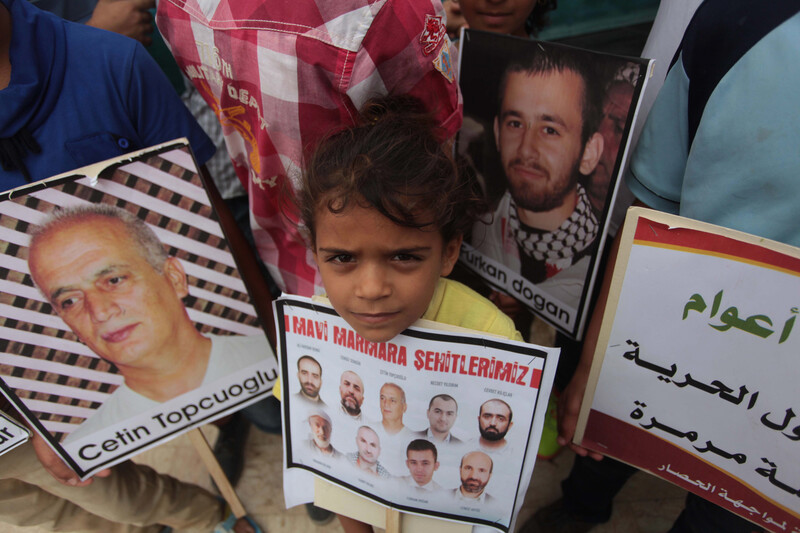The Electronic Intifada 19 February 2016

Palestinians carry posters showing the 10 passengers killed by Israeli commandos on the Mavi Marmara during a rally at Gaza City’s seaport in May 2014.
APA imagesA Spanish court has ordered three citizens to pay the legal fees for their recent appeal in a case against Israeli officials who ordered an attack on a fleet of ships attempting to break the siege on Gaza.
Laura Arau, David Segarra and Manuel Espinar were on board the Mavi Marmara when it was raided by Israeli commandos in international waters in May 2010.
Arau, a filmmaker, told The Electronic Intifada she experienced the attack as if she was in a war movie. “By the end of the attack, the floor of the boat was red from blood,” she said.
The three were among the hundreds of activists who participated in the international flotilla of six boats, who were detained in international waters, taken to Israel against their will and interrogated before being expelled.
It was on board the Mavi Marmara, the largest ship in the flotilla, that Israeli forces killed nine people. A 10th victim died from his injuries in May 2014.
Disturbing precedence
“They don’t respect the victims of war crimes by imposing the costs,” Gonzalo Boyé, the lawyer representing the three litigants, told The Electronic Intifada.
Boyé said this is the first time such costs have been ordered on plaintiffs in a suit involving universal jurisdiction over war crimes, a decision that sets a disturbing precedent for future litigation.
The United Nations Human Rights Council found that Israel’s attack on the civilian ships in 2010 “constituted grave violations of human rights law and international humanitarian law.”
In July 2010 the three Spanish citizens sued seven Israeli politicians and military officials, including Prime Minister Benjamin Netanyahu, under Spain’s universal jurisdiction law, which formerly allowed the national courts to prosecute crimes of global significance that took place outside the country’s borders.
But since the filing of the case, Spain has significantly hampered its courts from prosecuting international crimes, particularly when they carry geopolitical consequences.
In November 2015, José de la Mata, a Spanish national court judge, instructed the Spanish police to notify him if any of the seven officials set foot on the country’s soil.
This was the extent of what he could do following new restrictions on the court’s role in international crimes.
Political interference
Following his ruling, a spokesperson for the Israeli foreign ministry told media, “We are working with the Spanish authorities to get it canceled. We hope it will be over soon.”
A month later, on 22 December 2015, the Spanish high court annulled de la Mata’s instructions, removing the seven officials from the police database.
Boyé told The Electronic Intifada that the high court’s reversal was unprecedented.
He appealed the ruling. But the appellate court upheld the decision and ordered the litigants to pay the cost of the appeal. The cost has yet to be set.
Boyé believes the court’s decision may have been influenced by Israel’s political interference.
He is appealing the decision to Spain’s constitutional court. If they fail there, Boyé says he will appeal to the European Court of Human Rights.
Attack on universal jurisdiction
Over the last seven years, Spain has gutted its once vigorous universal jurisdiction law that allowed the country to lead the world in pursuing suspected war criminals.
Most famously, an action under this law led to the 1998 arrest in London of Chilean dictator Augusto Pinochet. It has also been used to pursue individuals accused of crimes committed in Tibet, Iraq, El Salvador, Guatemala and by the United States.
Though it has resulted in few prosecutions in Spain, the law has been credited with triggering legal actions in suspects’ home countries.
Originally written in 1985, the law extended the jurisdiction of Spanish courts to certain international crimes, including genocide, terrorism, piracy and crimes against humanity.
Beginning in 2009, however, the country began restricting the law in what was considered a response to pressure from the United States and Israel over pending litigation against nationals of the two countries.
In January 2009, a Spanish judge had agreed to pursue a complaint of war crimes against Israeli officials over the July 2002 extrajudicial killing of Salah Shehadeh, a Hamas commander. Israel dropped a one-ton bomb on the apartment building in which Shehadeh lived, killing 15 people, including 8 children, and injuring dozens.
Following the decision, Spanish foreign minister Miguel Ángel Moratinos reportedly promised Israel’s then foreign minister Tzipi Livni that he would seek to have the law changed.
By October 2009, the law had been amended.
In 2014 the law was further curbed by requiring that the alleged perpetrators be present in Spain and that the vitctim have been a Spanish citizen when the crime took place. [The law also made it difficult for human rights groups to file litigation]](http://www.csmonitor.com/World/Europe/2014/0410/Spain-A-human-rights-ave…) without representing a specific victim.
At the time, human rights organizations described the new law as a political intervention in the courts to accommodate Spain’s geopolitical ambitions in Asia, particularly economic relations with China.
“The point was to establish control measures to remove the discretionary power of the investigative judge,” Almudena Bernabeu told The Electronic Intifada. Bernabeu is a lawyer with the Center for Justice and Accountability, a human rights legal group based in San Francisco that combats torture and other international crimes through worldwide litigation.
The 2014 law was fast-tracked after a Spanish court had ordered international arrest warrants for former Chinese officials over human rights abuses in Tibet.
Double standard
At the time, Human Rights Watch noted a double standard in international justice in which global powers such as the United States, China and Russia were exempt.
Boyé includes Israel in that list of countries effectively enjoying immunity.
“The leading political parties in Spain see these universal jurisdiction cases as a pain in the neck,” Bernabeu said, noting that universal jurisdiction offered judicial solutions to political problems.
“They expose the truth about political agreements and political silence,” she added.
The gutting of Spain’s universal jurisdiction law has not entirely eroded its efficacy, but it has rendered the court dependent on political will.
This month, Spain successfully secured the extradition of a Salvadoran colonel from the United States so that he can face prosecution in its courts for the murder of six Jesuit priests.
“If you look at the panorama of cases, it’s clear that cases that go forward are those concerning countries like Guatemala and El Salvador, countries that don’t have any commercial or political interests that can be undermined,” said Bernabeu, who is the lead attorney in the Jesuit priest case.
Charlotte Silver is an independent journalist and regular writer for the Electronic Intifada.





